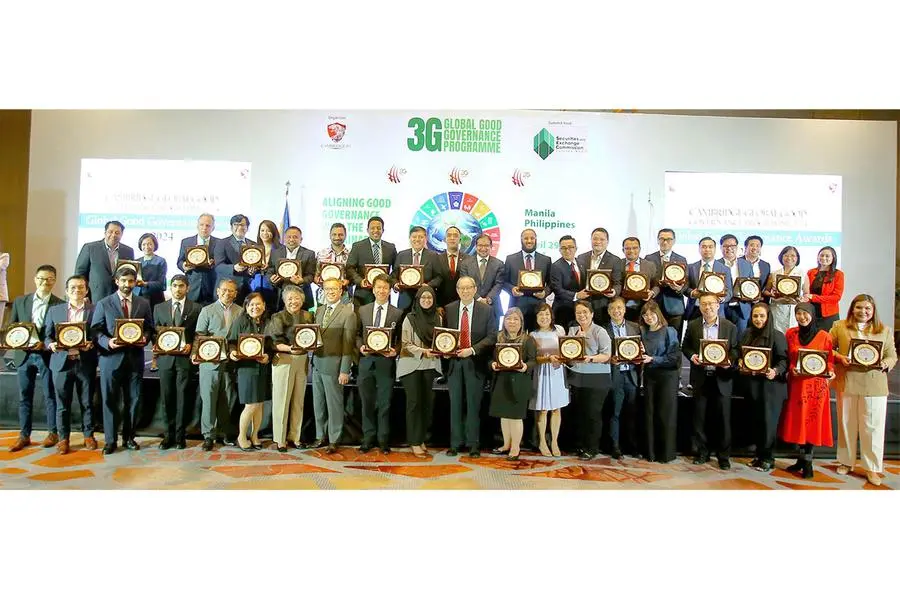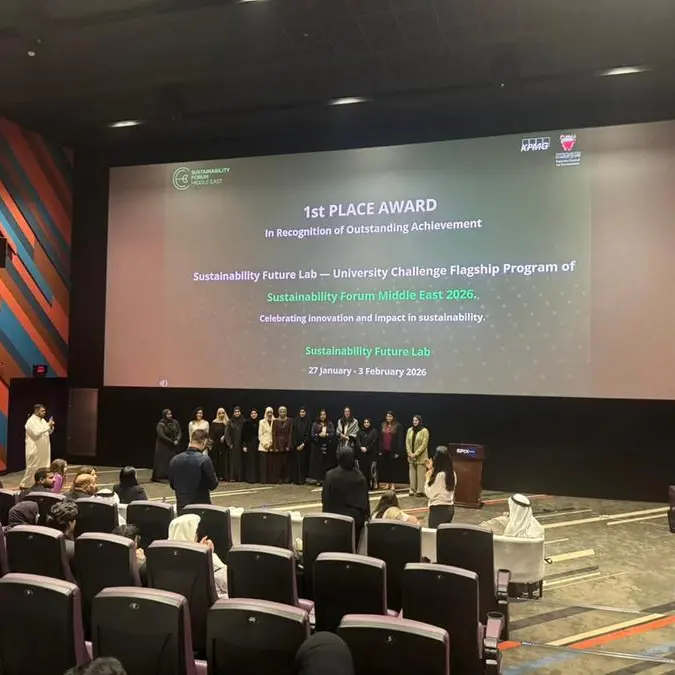PHOTO
Manila – The Global Good Governance Summit was held in Manila, Philippines, under the auspices of the Global Good Governance Programme organised by Cambridge IFA. This summit convened ambassadors from the UAE, Malaysia, Thailand, Singapore, Canada, Lao PDR & UK, VIPs including the heads of Chambers of Commerce from Korea, Malaysia, and Britain, business leaders, government officials, philanthropists and influential figures from around the world, to discuss and deliberate on strategies for fostering a sustainable future. The theme of the summit revolved around bridging the gap in achieving the SDGs and the role of effective leadership in bringing together governments, corporations and social sectors to create impactful strategies, overcome challenges, and lead the way towards a sustainable and prosperous future for all.
The summit was formally opened by Dr Humayon Dar, Chairman of the Cambridge Global Good Governance Programme and included a Welcome Address from Atty. Emilio B. Aquino, Chairperson & CEO, Securities and Exchange Commission Philippines, and a keynote speech from Secretary Frederick D. Go, Special Assistant to the President for Investment and Economic Affairs.
Dr Dar underscored the crucial role of governance in private business as well as within the charity sector, emphasising the importance of transparency and accountability.
“Governance is continuously evolving. From a simple notion of the act or process of governing or overseeing the control and direction of something (such as a country or an organisation), it has now embraced reporting, transparency, sustainability, corporate social responsibility and a lot more. The UN’s Sustainable Development Goals have given the concept a wider and more comprehensive scope.”
Atty. Aquino appreciated the efforts of the corporate sector in implementing sustainability in their operations and discussed the role of SEC Philippines in promoting ease of doing business, good corporate governance and sustainability, placing digital innovation as a vital component of the SEC SuperVision 2028.
Secretary Go talked about the sustainability initiatives that businesses have incorporated in their framework to support the government’s agenda for achieving the SDGs. The energy sector is the most forward sector to embrace renewable energy solutions and advancing the President’s agenda in driving economic growth and foreign investment in the country.
Under the overarching theme of “Aligning Good Governance with UN SDGs," the 3G Summit explored the concepts, intersection, and practical implications of effective governance on sustainability and how it could assist organisations in achieving the United Nations Sustainable Development Goals agenda for 2030.
The summit also navigated the impact of sustainability megatrends, including climate change, demographic shifts, and evolving consumer preferences on businesses. The forum centred on investigating inventive approaches to synchronise good governance with the endeavour of achieving UN SDGs, highlighting the significance of collaboration and innovation.
The first panel discussion revolved around, “Innovative Leadership for Sustainable Future: Uniting Governance, Industry, and Philanthropy towards SDGs’ Achievement” and was moderated by Khuram Shehzad, Global Head of Business and Strategy at Cambridge IFA. This session brought together thought leaders from diverse government, corporate and social sectors to discuss the role of innovative leadership in driving sustainable development agendas, including Atty. McJill Bryant T. Fernandez, Commissioner, Securities and Exchange Commission Philippines; Sarimah Talib, Vice President - Sustainability and External Relations, Bumi Armada Berhad, Malaysia; Ramon Rivero, Head of Corporate Planning and Strategy, Robinsons Land Corporation (RLC), Philippines; Mohamad Ali Al-Ghamdi, Chief Governance Officer, Qatar Charity, Qatar.
The panellists emphasised the importance of collaboration between governance, industry, and philanthropy in achieving SDG targets, highlighting successful case studies and best practices from around the world. Governance is no longer about compliance but rather about survival. The actions of climate change incorporate the survival of the planet and the industry. The panellists talked about exciting renewable projects that factor in carbon reduction and harnessing solar power.
Organisations are increasingly embracing ESR (Environmental Social Responsibility) initiatives that blend social progress with sustainable investments. They're directing resources toward projects that yield not only financial returns but also promote positive social change. These initiatives promote community well-being, environmental stewardship, and economic resilience creating lasting change while ensuring long-term viability and prosperity for all stakeholders involved.
The second panel was on “Strategic Governance for Bridging the SDGs Gap in Public, Private, and Social Sectors”, moderated by Shiza Rabbani, Head of Marketing and Branding, at Cambridge IFA. The panellists included Atty. Federico P. Tancongco, Senior Vice President, BDO Unibank, Inc., Philippines; Secretary Robert E.A. Borje, Vice-Chairperson and Executive Director, Climate Change Commission, Philippines; Kamrul Tarafder, President and CEO, ASA Philippines Foundation, Philippines and Prof. Ittichote Chuckpaiwong, Vice President for Environment and Sustainable Development, Mahidol University. This session focused on strategic governance frameworks for bridging the gap towards the achievement of SDGs across public, private, and social sectors. Panelists explored the challenges and opportunities inherent in multi-sector collaboration, emphasising the need for adaptive governance structures and inclusive decision-making processes.
Capacity-building initiatives are necessary to enhance climate resilience and understanding of climate-related SDGs across sectors. These efforts aim to provide technical skills, foster collaboration, and promote awareness to address climate risks and advance sustainable development goals. Strategic governance has a pivotal role to play in prioritising sustainable development goals, fostering collaboration, setting clear objectives, monitoring progress, and ensuring that efforts are integrated, efficient, and effective.
Corporations, government organisations, the social sector and individuals, all have a responsibility towards adopting sustainable practices, advocating for sustainability initiatives, and integrating sustainability principles into decision-making processes.
Transparency, accountability, and ethical leadership are critical in governance for sustainable development across sectors as they foster trust, ensure responsible decision-making, and promote long-term sustainability.
Keynote addresses and networking sessions provided additional opportunities for participants to exchange ideas, share insights, and forge new partnerships towards advancing global sustainability agendas.
The Global Good Governance Summit extends its gratitude to all participants, speakers and guests for their contributions to the success of the event. Cambridge IFA is in particular grateful to the Securities and Exchange Commission Philippines for graciously serving as our esteemed local host for the 3G Summit. Their invaluable support and collaboration have been instrumental in making this event possible, and in advancing the dialogue on governance and sustainability.
The Global Good Governance Report 2024 was also launched in the evening, signifying a crucial juncture in the continuous discourse regarding governance and sustainability at a global level. Through thorough research and perceptive analysis, the report delivered a thorough examination of the present state of governance practices globally, illuminating both achievements and areas necessitating improvement. Acting as a catalyst for change, the Report spurred stakeholders to intensify their endeavours in advancing principles of good governance for the enhancement of societies and the planet.
The evening was particularly entertaining as institutions and individuals' sustainable efforts, practices, policies, and innovative products and services were acknowledged, applauded, and celebrated at the annual 9th Global Good Governance (3G) Awards 2024.
The 3G Awards recognised governments, corporations, and individuals from more than 15 countries spanning 5 continents for their exemplary leadership and sustainable practices in the realms of good governance and social responsibility.
Professor Humayon Dar, Chairman of the Global Good Governance Awards, in his speech, emphasised the shared responsibility we have towards each other and the rest of the world and the fact that Asian countries are emerging as sustainability champions.
“As you will see later, many movers and shakers in the Global Good Governance Awards come from Asia. Given this new trend, marginal value addition to global good governance has an ever-increasing share contributed by Asia. This means that a bulk of global social capital in future will originate from this part of the world. Hence, there is a need to establish new infrastructure bodies related to good governance, sustainability and social responsibility in the emerging segment of the world.”
Mr Niño Raymond B. Alvina, Officer-in-Charge Undersecretary, Policy Development and Management Services Group (PDMSG), Department of Finance graced the ceremony and gave a Keynote Address. He emphasised the importance of good governance and the role SEC Philippines is playing in promoting corporate governance practices and disclosures. He went on to talk about the SEC supervision 2028 and the strategies other organisations must adopt to integrate sustainability into their business operations and work towards an equitable world.
Our revered winners came from countries like the Philippines, Thailand, Malaysia, Indonesia, Singapore, UAE, Saudi Arabia, Africa and Qatar and included; Prof. Dr Sombat Thamrongthanyawong, Walailak University, Qatar Charity, Alliance Global Group, Inc. (AGI), Mahidol University, Green Bond Framework by BDO Unibank, Bloomberry Resorts Corporation, Robinsons Land Corporation, Jollibee Foods Corporation, SOMTEL, Brunei Institute of Leadership & Islamic Finance (BILIF), MREIT, Inc., Megaworld Corporation, San Miguel Corporation, DRB-HICOM Berhad, Yinson Holdings Berhad, DigiPlus Interactive Corp, Bumi Armada Berhad, Rizal Commercial Banking Corporation, Dubai Customs, Securities and Exchange Commission Philippines, GDRFA Dubai, and Amanah Ikhtiar Malaysia. The most prestigious 3G Leadership Award for Charity and Donations 2024 was presented to Sulaiman bin Abdulaziz Al Rajhi Projects - Sulaiman bin Abdulaziz Al Rajhi Charitable Foundation.
Some organisations were unable to travel to Manila and included, Vista Land & Lifescapes, Inc, Zain Group, RHB Bank Berhad, Hong Leong Bank Berhad, PT Bumi Serpong Damai Tbk, Bahri, King Power Corporation Co., Ltd, DEWA, Abu Dhabi National Energy Company (TAQA) - Sustainability and Climate Change Team, Dubai Police, PETRONAS Dagangan Berhad, BAZNAS.
For more information about the Global Good Governance Awards and Summit, including highlights of the events and updates on future initiatives, please visit [https://3g-summit.com/].
About Cambridge IFA:
Cambridge IFA is a financial services intelligence house that specialises in developing and utilising powerful cutting-edge analytical tools to evaluate business data, assess macroeconomic indicators and understand market trends, leadership positioning and brand development relevant to the development of the financial services industry globally.
The principal activity of Cambridge IFA is developing performance indicators specific to alternative practices of banking and finance. It also aims to provide strategic advice to governments, financial institutions and multilateral organisations in the development of financial markets including alternative banking and finance products, procedures, practices and policies.
Through our strong and invaluable relations with policymakers and private sector industries, we have insights into market and business trends as well as policy changes. This allows us to identify and prioritise common issues and provide perspectives and solutions that are practical, focused and effective; which will increase the competitive advantage of our clients.
Cambridge IFA is a member of the Cambridge-Edbiz Group of Companies headquartered in London.




















